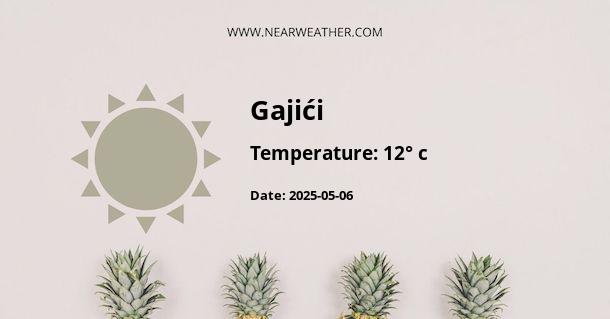The Climate and Weather of Gajići, Bosnia and Herzegovina
Bosnia and Herzegovina, a country known for its rich history and diverse landscapes, offers a unique blend of climates within its borders. The small village of Gajići is no exception, revealing a weather pattern that is emblematic of its geographical setting. Situated in the heart of the Balkan Peninsula, Gajići experiences a moderate continental climate with certain nuances that beckon a more in-depth analysis.
The Continental Influence on Gajići's Climate
The continental climate typically denotes warm to hot summers and cold winters. Gajići's position away from major bodies of water ensures that it experiences significant seasonal variations in temperature. Statistics from regional weather stations provide a clear picture of what locals and visitors alike can expect throughout the year.
Temperature Ranges
Temperature data compiled from the meteorological stations in the region indicate average summer highs that can range from 25-30°C (77-86°F), with occasional heatwaves pushing temperatures higher. Winters, on the other hand, showcase a very different scene with average lows plummeting to -5 to 0°C (23-32°F), and sometimes even lower during intense cold spells.
Precipitation Patterns
Gajići's precipitation levels are affected by its topography, with rainfall distributed unevenly throughout the year. The rainfall patterns are as follows:
- Spring: This season marks the beginning of a wetter period. Showers are common, and the increase in rainfall assists in the lush growth seen across the countryside.
- Summer: Despite the higher temperatures, summer can still bring bouts of heavy rainfall, often in the form of thunderstorms. Nonetheless, there are also extended periods of dry weather, particularly in the month of August.
- Autumn: The damp and rainy conditions typical of autumn lead to cool and misty days, with precipitation peaking during this period. It’s not uncommon for Gajići to experience its highest annual rainfall during these months.
- Winter: Snowfall is a regular occurrence in Gajići during winter months, adding to the chill factor and transforming the landscape into a scenic winter wonderland.
Seasonal Wind Patterns
One interesting aspect of Gajići's weather is its wind patterns. Throughout the year, various wind types affect the village:
- The Bura: A cold and dry northeasterly wind, known for its intensity and ability to bring clear skies but significantly lower temperatures especially in the winter.
- The Jugo: This southeasterly wind is humid and often associated with stormy weather, predominantly occurring in the transitional periods between seasons.
Understanding Gajići's Microclimate
Gajići's unique microclimate contributes to its charm and influences local agricultural practices. The village’s altitude and proximity to mountain ranges can create microclimatic conditions that make for localized weather that may diverge from broader regional forecasts.
Monthly Averages
To give a clearer view of what one can expect weather-wise in Gajići, the following table presents average monthly temperatures and precipitation:
| Month | Average High (°C) | Average Low (°C) | Average Precipitation (mm) |
|---|---|---|---|
| January | 3 | -3 | 60 |
| February | 6 | -1 | 55 |
| March | 11 | 2 | 60 |
| April | 16 | 6 | 70 |
| May | 21 | 11 | 80 |
| June | 25 | 14 | 90 |
| July | 27 | 16 | 80 |
| August | 27 | 16 | 70 |
| September | 23 | 12 | 70 |
| October | 17 | 8 | 80 |
| November | 10 | 3 | 100 |
| December | 5 | -1 | 90 |
The Impact of Climate Change on Gajići
The reality of climate change has not spared Gajići. The regional climate has exhibited signs of transformation, aligning with global patterns of changing weather conditions. Studies have shown trends of warming temperatures, with the number of hot days increasing and cold periods becoming shorter and less intense. Precipitation patterns also seem to be altering, with some models predicting more extreme weather events, including heavier rainfall during wet periods, leading to increased risks of flooding.
Adaptation and Resilience
As extreme weather events become more frequent, understanding weather patterns is crucial for Gajići's community and its agriculture-centric economy. Farmers and residents are adapting their practices to be more resilient to the unpredictability, such as:
- Implementing advanced irrigation and water management systems to cope with both excess rainfall and drought conditions.
- Adjusting planting schedules and crop selection to better align with the shifting seasons.
- Increasing the use of renewable energy sources to reduce the carbon footprint and combat the broader implications of climate change.
Essential Tips for Travellers
For those planning to visit Gajići, understanding the local weather can enhance the travel experience. Here are some tips based on the climate profile:
- Summer: Pack light clothing for the day but bring a jacket for potentially cooler evenings. Always be prepared for the occasional downpour.
- Winter: Heavy winter gear is essential to enjoy the snow-covered landscape comfortably.
- Spring and Autumn: Layered clothing works best, allowing adaptation to unpredictable temperature swings and wet conditions.
- All Seasons: Keep an eye on the local weather forecasts, which can often provide valuable information about approaching weather systems and conditions.
In summary, Gajići’s continental climate, with its distinct seasonal changes, presents various challenges and opportunities for both residents and visitors. A nuanced understanding of its weather patterns serves as an indispensable tool for agriculture, daily life, and effective travel planning in this beautiful part of Bosnia and Herzegovina.
A - Gajići's Latitude is 44.576672 & Longitude is 18.183889.
A - Weather in Gajići is 1° today.
A - Climate Conditions in Gajići shows broken clouds today.
A - Humidity in Gajići is 75% today.
A - Wind speed in Gajići is 3.46 km/h, flowing at 237° wind direction. today.
